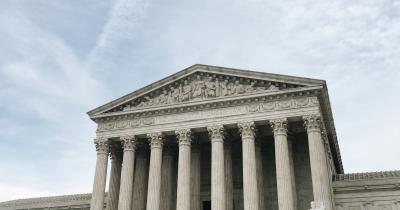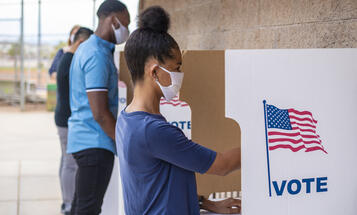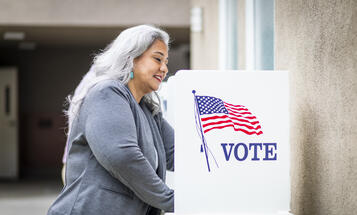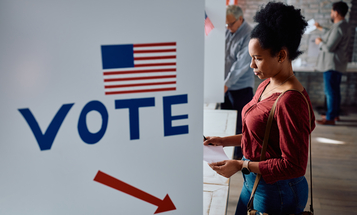
Remedying Shelby v. Holder: The Need for an Inclusive Democracy Agenda
We must envision—and work toward—a democracy agenda that reflects and responds to all the diverse communities who call the United States home.

The Shelby decision highlights the importance of acknowledging histories of discrimination and centering the communities that have been most impacted.
Voter suppression and intimidation has increased dramatically since June 25, 2013, the day 6 years ago when the Supreme Court decision Shelby v. Holder gutted the 1965 Voting Rights Act (VRA). In Shelby, the Court undercut one of the VRA’s most important provisions: the requirement that states with a history of discrimination in voting seek preclearance before making changes to election law. For nearly 50 years, the VRA prohibited the de jure and de facto barriers that once kept millions of voters from casting ballots, including literacy tests and poll taxes, as well as more overt exclusionary tactics like violence and intimidation. In the absence of such obstruction, and for the first time in American history, African American men and women freely exercised their right to vote. Over time, representation among African Americans and other communities of color in Congress and in state and local elected leadership grew significantly. The VRA opened new pathways to political power-building in all communities of color, and it has in turn moved us closer to a reflective, inclusive democracy.
Today, there is legislation sitting in Congress, the Voting Rights Advancement Act, that would restore and strengthen the protections of the VRA. And earlier this year the House passed a sweeping elections reform bill, the For the People Act, which would also remedy the problems created by the Shelby decision and do a great deal more to promote ballot access and fair representation. Both pieces of legislation would make significant and valuable improvements to the way we conduct elections and practice democracy in our country. Both deserve to be debated and voted on in both houses of Congress. However, neither alone—or even together—will solve all the problems facing our democracy, nor will they guarantee a democracy in which all people, regardless of the color of our skin, our income, our age or ability, are able to be active participants in the political process.
The Inclusive Democracy Project (IDP) is a majority-person of color cohort of powerful state-based leaders who organize working-class communities and communities of color, and advance bold campaigns in 15 states across the U.S.
As Demos and allies work to protect and strengthen our democracy, the Shelby decision highlights the importance of acknowledging histories of discrimination and centering the communities that have been most impacted. Indeed, this is one reason Demos partners with grassroots organizations through the Inclusive Democracy Project (IDP). IDP is a majority-person of color cohort of powerful state-based leaders who organize working-class communities and communities of color, and advance bold campaigns in 15 states across the U.S. Whether fighting for rights restoration for returning citizens in Florida or public financing of elections in Washington, D.C., IDP partners elucidate the relationship between structural inequality and civic participation.
We’re developing our inclusive democracy agenda alongside members of Demos’ Inclusive Democracy Project, leaders and communities of color who are building power and investing in ideas that can create an inclusive democracy.
As we fight the latest efforts to suppress the vote unleashed by the Shelby decision and work to expand voting rights, our partners inspire us to go further and imagine what it would take to build a truly inclusive democracy. We must envision—and work toward—a democracy agenda that reflects and responds to all the diverse communities who call the United States home.
Demos is therefore developing an Inclusive Democracy Agenda in conversation with IDP partners: a set of policies that, while ambitious, represent steps we must take if we are to live up to our ideals as a democratic society and make it possible for all people to not just survive, but thrive in our democracy. In doing so, Demos is following the leadership of those who understand better than anyone the stakes—communities of color who have been excluded from democracy since the founding of the United States and, as a result of their proximity to the problem, have done the most creative thinking about the solutions. We’re developing our inclusive democracy agenda alongside members of Demos’ Inclusive Democracy Project, leaders and communities of color who are building power and investing in ideas that can create an inclusive democracy.
Establishing an inclusive democracy requires bold, transformative changes to our voting processes and electoral systems.
Establishing an inclusive democracy requires bold, transformative changes to our voting processes and electoral systems. For example, why stop at re-enfranchising people upon completion of a felony conviction, when our values demand that all people of age have the inalienable right to vote, regardless of incarceration status or conviction history? In an inclusive democracy, the right to vote is real for all people, independent of any involvement with the criminal (in)justice system.
Further, creating an inclusive democracy requires thinking beyond the formal political rules of voting and elections to the very institutions of governance and participation themselves, which too often serve to keep people from meaningful democratic engagement and control. It demands creating cultures that promote and structures that facilitate co-governance between elected officials and the communities they represent, including direct lines of communication, two-way accountability, and the guarantee that the will of the people will not be subverted by unaccountable lawmakers or unelected decision-makers. And it demands creative thinking about how to democratize other areas of our lives, from the workplace and the environment to the goods and resources we consume on a daily basis.




